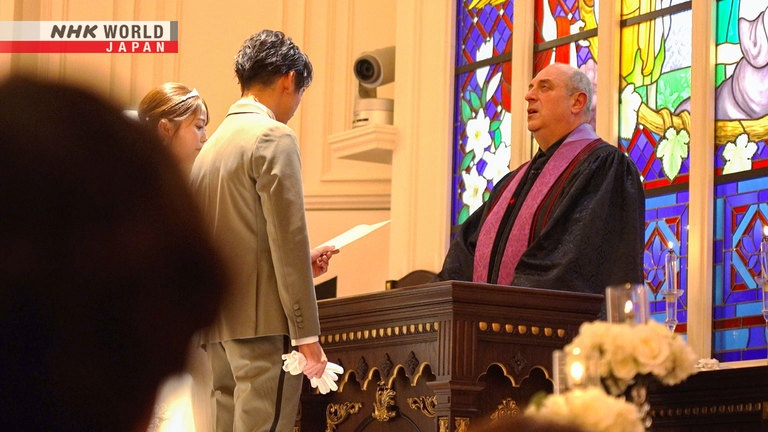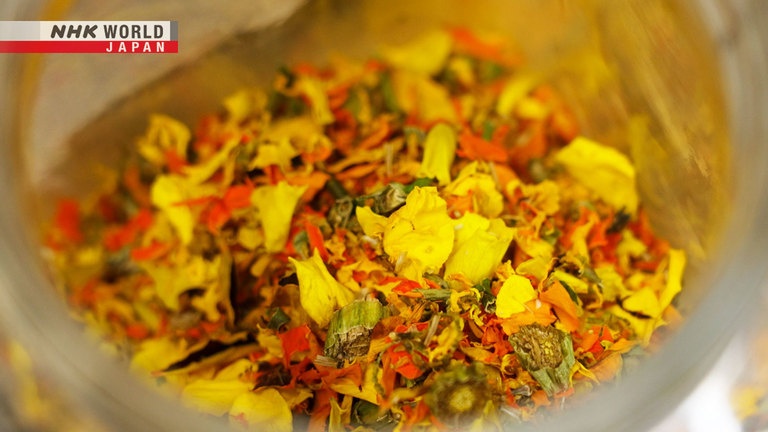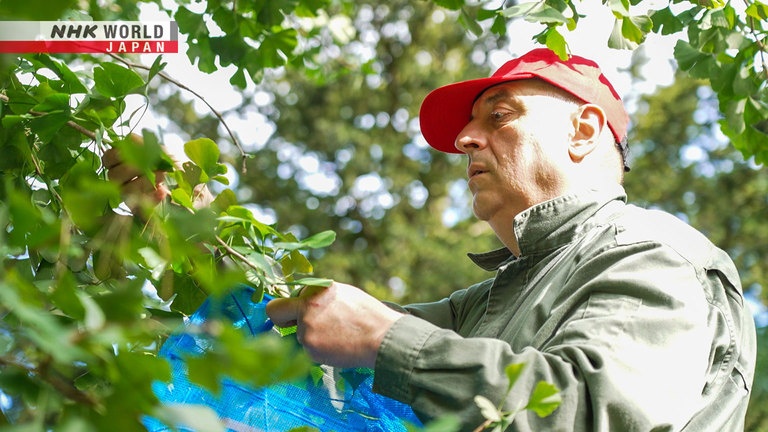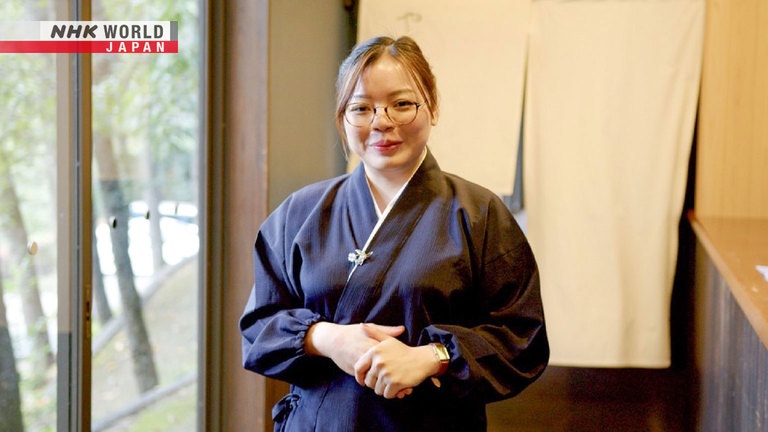Pastor Istvan's Botanical Blessings
We meet Istvan Lorincz, a Romanian of Hungarian origin who's a pastor and expert herbalist in Sapporo, Hokkaido Prefecture, as well as Vietnamese Hoai Thuong who works at a hot spring inn in Shimane Prefecture.




Transcript
Where We Call Home.
Japan's northernmost two-million-inhabitant city, Sapporo.
Working at this local wedding chapel is a pastor.
Istvan Lorincz, a Romanian of Hungarian origin.
He's also an expert herbalist.
Lovely aroma.
With the plants he gathers, he makes teas and ointments
that are popular with visitors to the church and his neighbors alike.
I don't need expensive medicines.
I find all I need in nearby
forests and mountains.
After fleeing the turmoil in his homeland, Istvan struggled to survive.
I wasn't hit, but a bullet struck
someone next to me in the head.
With his knowledge of herbs, Pastor Istvan hopes to share a peaceful life with his community of adoption.
Hokkaido's urban heart - Sapporo.
Beside business districts and residential areas are woods inhabited by wildlife.
It's truly a city in harmony with nature.
Every weekend, weddings are being held in this neighborhood church where Istvan works as a pastor.
Our Lord Jesus died on the cross
so that those who have faith...
will be granted salvation
and eternal life.
Just as you love yourself,
love each other.
When husband and wife do so,
their life together is truly blessed.
Ever since Istvan came to Japan in 2007, he's joined many couples in wedlock.
He puts a lot of importance on communicating with the bride- and groom-to-be.
Together with his wife and fellow pastor Michiyo, he provides guidance to the couples.
Can you tell us how you met?
We were in the same seminar in university
and often studied together.
To create a relaxing mood, Istvan has just the thing.
Herbal tea prepared with plants he gathered.
It's such a nice aroma. I'd love it
if our apartment smelled like this.
Yes, it's relaxing.
I'm glad!
I'm glad you like it. I chose correctly.
The herbs' aroma helps the fiances feel more at ease.
When there's no wedding, Istvan heads into the mountains to collect wild herbs.
Today, he came to a local ski area.
When gathering plants, he makes sure to ask permission from the land's owner.
Some red clover.
It strengthens women's bones.
A real blessing.
He only takes a little of each kind of plant.
He makes sure to leave some so that they'll keep growing every year.
Right now, goldenrod is blooming.
Among what look like weeds to many
are wonderful medicinal herbs.
Istvan was born in 1964 in Romania's region of Transylvania.
This mountainous land was once a territory of Hungary.
After the first world war, it became part of Romania.
Istvan and his family's Hungarian roots often made them the target of harsh discrimination.
We spoke Hungarian at a bus stop.
A man came up to us.
He said, "Speak Romanian!"
He hit me and my mother.
From early childhood, Istvan remembers going out in the mountains with his mother to collect wild herbs.
The plants supported their physical and emotional health
during times when they had difficulty finding enough to eat and couldn't afford to visit a doctor.
While the plants are still fresh, he processes them at home.
He keeps a stock of herbs he collects through the seasons and uses them in everyday life.
I'll use this today.
The plants that are difficult to find in Hokkaido, he grows at home.
For dinner tonight: oven-baked pork shank.
Istvan is the family chef.
He says using plenty of herbs in their daily diet helps everyone stay healthy.
Istvan and Michiyo have four children, three of which have left the family nest.
The couple lives with their daughter Shion, the baby of the family.
She's a great assistant gatherer.
- "You've become an expert?"
- I wouldn't say "expert," but I can help.
After the meal, Istvan likes to tickle the ivories.
Before he became a pastor, he was a professional pianist.
Romania was once under the Ceausescu dictatorship.
Showing talent for the piano from a very early age, Istvan underwent education for gifted children.
Though he was Hungarian, still in his teens,
he was appointed as an official pianist for the government, performing at banquets day and night.
Joining the military meant a tough life.
I was willing to do anything
to avoid being drafted.
However, in 1989, the government collapsed under revolts against the regime.
Istvan got caught up in the shoot-outs that erupted in urban areas.
I wasn't hit, but a bullet struck
someone next to me in the head.
Then one day, he received a notice from the secret police.
I was ordered to enroll at once.
It was a Friday night.
I'll never forget it.
I hurried and got on a train to Budapest.
I thought I'd never get to see
my family again.
Miraculously, I was able
to cross the border.
But I had no place to live.
I became homeless.
He eventually found a live-in job as cleaning staff.
He entered a college of theology, while playing the piano at a hotel in the evenings,
doing whatever he could to make ends meet.
That's when he met Michiyo, who performed at the hotel as a vocalist.
As they listened to him play, people
had an enraptured look on their faces.
It was amazing.
Through his performance
he could reach people's hearts.
United by music, the two deepened their mutual trust, and, one year after they met, they got married.
Four children later, Istvan finally found a peaceful life.
Because he'd kept struggling to survive for so many years,
the days when he gathered herbs were far behind.
It was after he hit forty that medicinal plants became part of his life once again.
It began when the family moved to Michiyo's hometown of Sapporo to help take care of her aging parents.
However, it was Istvan's first experience living in a country with a culture and language so different from his own.
Soon after I arrived in Japan,
I ran into a homeless man.
That moment I worried that,
as I couldn't speak Japanese...
I'd have an even harder time than he did.
The stress from his new life caused him to break out in hives.
That's when he noticed the wild plants that grew near their house.
As Hokkaido and Romania are pretty much along the same latitude,
the two countries also seemed to share similar vegetation.
I found plants here
that also grew in Romania.
What a pleasant surprise.
Then, making use of his knowledge of medicinal herbs he'd acquired in childhood,
he prepared tea and ointment that helped him recover.
But herbs didn't only bring him good health.
Today, he visits a neighbor.
Hi! How are you?
He brings herbal tea and cream to thank her for letting him have some seeds from her garden.
For years, he's fostered relationships with his neighbors.
We have some yarrow
growing in our garden.
When he told me he used it to make
medicinal cream, I gave him some seeds.
With herbs he builds connections in his country of adoption.
This year, Istvan started growing herbs in his garden.
With fewer weddings being held during the pandemic,
he found more time to share the blessings of herbs with as many people as possible.
Having earned certification in naturopathic medicine in his homeland,
he puts effort into spreading his knowledge.
Nakanishi Shoya works as a car mechanic in Sapporo.
Every week, he comes to help Istvan prepare his herbs.
Today, they make a medicinal cream with marigold from Istvan's garden and beef tallow.
Nutrients from the flowers
slowly seep into the warm fat.
- The fat doesn't feel hot on the skin.
- No.
The fat containing extracts from the herbs is left to cool, and the ointment is ready.
In my work, I get cuts and hangnails.
This cream stops the bleeding, and
the pain is gone in a couple days.
Until a few years ago, Shoya lived with Istvan and his family.
When he was having trouble at home during his teenage years,
through the church, he met Istvan who took him under his wing.
Just like it was yesterday, Istvan remembers the time when Shoya first came here and couldn't even meet people's eyes.
He wasn't well at all.
He wouldn't open up so easily.
But I prepared some herb tea.
He said I was like a wise old hermit.
I knew the tea hadn't been in vain.
Herbs became a regular topic of conversation,
which eventually lead Istvan to offer Shoya advice about his future.
Shoya then became a certified mechanic at an auto-repair company, where his expertise earned him an award.
His encounter with Istvan had a major impact in his life.
He sees his goals through.
Looking at him, I began to think
I had to do the same.
The two of them believe in the herbs' power to help people.
This autumn, Istvan is going to gather a kind of plant he's never used before.
Ginkgo leaves.
They're said to help prevent the deterioration of memory and improve overall brain functions.
Ginkgo trees mainly grow in Asia, and are therefore a rare sight in Europe.
However, in his childhood, Istvan had heard of their leaves' beneficial effects.
He and Shoya visit a shrine outside Sapporo.
What a nice color.
He chooses leaves just before they fall, while they're still turning from green to yellow.
The trees on the shrine's grounds are in the perfect condition.
He asks the head priest, who was introduced by a friend, for permission to take some leaves.
We'd like to take a few leaves
from here and there if it's OK.
- Sorry to bother you.
- Not at all!
- Thank you.
- Take your time.
Istvan makes sure to establish a good rapport with the proprietors.
That's because, even though he's broadened his circle of acquaintances in the area,
cases where land owners are reluctant to let him gather plants aren't so rare.
Istvan puts effort in letting people know about his work as an herbalist.
Here's what we gathered today.
Thank you.
Many people come for ginkgo nuts,
but not for the leaves.
It's the leaves I want.
They're great for the brain.
- I want some too then.
- Of course, I'll bring you some.
To better preserve the leaves' freshness, he cuts them up in small pieces.
Then, he dries them in the oven and turns them into powder.
He works until late at night.
A week later, Istvan returns to the shrine.
Hi! I brought some tea.
As a token of appreciation, he offers the head priest some ginkgo-leaf tea.
Let's try.
A gentle flavor.
It doesn't taste "medicinal."
- Autumn leaves are the best.
- Oh, really?
A natural ingredient
that feels safe to drink.
I'm thankful to have opportunities
like this to broaden my horizons.
Wishing happiness to those with whom
we become friends is only natural.
Don't force your values on them.
Listen to what they want.
As Istvan was leaving, the head priest tells him to come back next year for more ginkgo leaves.
The last Sunday in October.
Istvan takes part in a local Halloween event.
He was asked to set up a booth for people to learn about herbs.
What a nice smell!
Little by little, Istvan's herbs are becoming a part of people's everyday lives.
Herbs are a bridge.
I'm here thanks to that knowledge.
It's thanks to my knowledge of herbs
that I can enjoy life.
Herbs bring us freedom and health.
Hi, I'm Hoai Thuong.
I've been in Japan for 7 years.
Today, I'll show you
my work at this inn.
Arifuku Hot Springs, Shimane Pref.
This is a famous hot spring area
with more than 1,300 years of history.
Thuong works at a hot-spring inn
that's been in business for 250 years.
The schedule for today.
I picture our guests in my mind
to better create a mood they'll enjoy.
I do that as I prepare.
2:00 p.m.
check-in starts.
Some guests.
Good afternoon and welcome.
Lovely weather today.
I'm glad.
It was cloudy this morning.
I worried it would rain.
Right this way.
This room is "Morning Mist."
Thank you very much.
Make yourself comfortable.
5:00 p.m.
dinner service.
Sashimi for two!
Here's the sashimi.
Some fresh wasabi from Shimane.
She describes the dishes
and how to enjoy them.
Grate it in a line, it'll be stronger.
Grate it in a circle, it'll be milder.
So, choose what you prefer.
We're full.
But there's more.
The main dish is coming.
- Join us.
- It's kind of you.
It was delicious.
Thank you.
Good night.
A fan of anime, Thuong came to Japan
in 2015 to study Japanese.
Impressed by Japanese customer service,
she studied hotel management in Osaka.
Eager to provide quality service,
she found her current job in 2022.
I want to think of our guests'
feelings first.
I sometimes get comments...
saying they could relax
and had a pleasant stay.
It makes me so happy.
How should we present this?
Thuong also helps select the tableware.
There'll be a new salmon dish tomorrow.
Maybe we don't need a spoon for the miso?
That plate is too big for the cup.
Something smaller.
This is lovely like this.
How about a round plate?
Oh, this is nice.
- It's lovely. Perfect.
- Let's go with this.
I directly serve customers.
So, I want to serve dishes
with the best presentation.
This is the inn's proprietress.
At an inn, it's important to chat
with guests, like during meal service.
I wondered how Thuong would do?
But she's very good at keeping
the conversation going.
Little by little, she observed
her colleagues...
and integrated what she learned.
She's so casual and approachable.
I can talk to her anytime.
She always offers advice.
She's so helpful.
10:00 a.m. the next day
check-out time.
Here is your receipt.
Thank you.
She speaks Japanese so well.
She came from far away.
She must miss her mother.
The meals too were wonderful.
I love this inn.
Have a safe trip back.
Thank you.
This little Buddha is my treasure.
A friend gave it to me.
When I get home, it welcomes me back.
It also sends me off in the morning.
It encourages me.
It's like a good-luck charm.
Coming to Japan, I've had my share
of problems and worries.
I had difficulty adapting to life here.
But I didn't want it to affect
how I attended guests.
The little Buddha helped
relieve my stress.
I want to create a relaxing mood
at the inn.